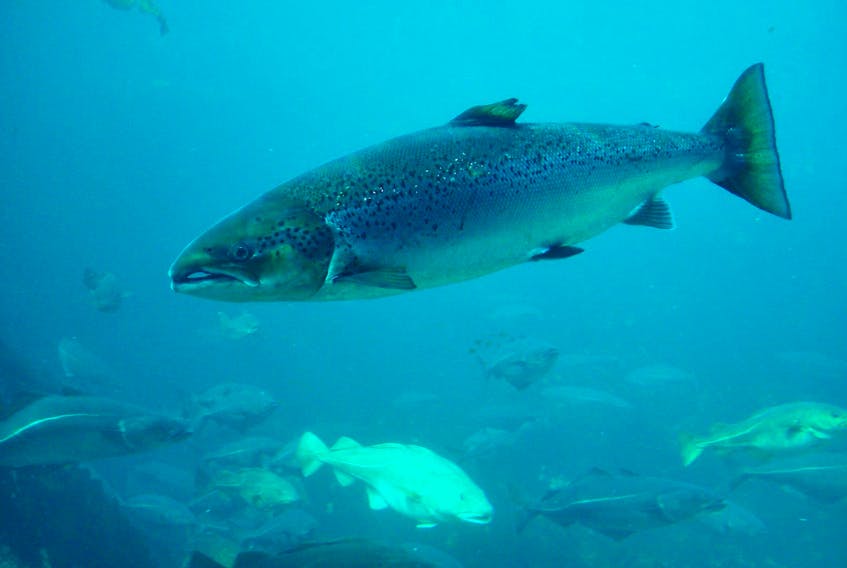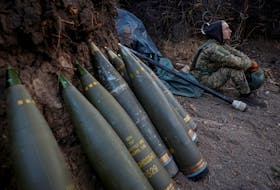Mark Lane, executive director of the Newfoundland Aquaculture Industry Association (NAIA) is obviously frustrated by the recent turn of events in the Open Net Pen (ONP) aquaculture industry (“Stand up for our seafood farmers,” The Telegram, Nov. 2).
Lane wants everyone to view the massive kill of 2.6 million salmon on our south coast in August as an isolated occurrence caused by an unforeseeable environmental event similar to a crop farmer getting hit by drought.
This is a nice analogy if only it were that simple.
However, when millions of salmon die in their pens the devastation is not limited to the aquaculture company.
As we all now know the surrounding environment is severely impacted as the company transfers the dead salmon from the net pens. The image of the white fat coating the coastline attests to the magnitude of the impacts.
The analogy to regular agriculture ends when net pens are placed in the ocean.
The analogy to regular agriculture ends when net pens are placed in the ocean.
Unfortunately, what happened in August is not an isolated event but just one more in a list of very serious incidents that have been happening with alarming regularity since the industry was first established on the N.L. South Coast in the early 1990s.
These include a kill of two million salmon in 2014 from winter chill and four million in 2012 from Infectious Salmon Anemia (ISA).
In 2013 there was a major escape event that has wreaked genetic havoc on the wild Atlantic salmon in our south coast rivers.
The aquaculture industry has not acknowledged ownership of this tragedy.
If you visit the Canadian Food Inspection Agency website you will learn the N.L. salmon aquaculture industry has had 12 outbreaks of ISA since October 2016.

These events have not been reported to the public and are only now coming to public attention because of the salmon kill in August and related media coverage.
In the area of public trust, the aquaculture industry is its own worst enemy.
It has developed an aura of secrecy and disregard for public scrutiny that inevitably leads to a loss of confidence and trust.
Government hasn’t been a great help by refusing to acknowledge the legitimate interest of other stakeholders, including the public.
Together the industry and government have succeeded in destroying public trust in the aquaculture industry simply by excluding other genuine stakeholders.
When an event like a massive kill occurs and the public doesn’t find out about it for over a month, that’s a serious breakdown in trust and accountability. The more you conceal, delay and cover-up the worse things get.
Lane decries the presence of the Sea Sheppard Society visiting the area and documenting the environmental impacts.
This kind of coverage is inevitable once you have developed a reputation for avoiding public disclosure. It doesn’t help to attack organizations with a genuine and valid interest in the industry. The Atlantic Salmon Federation is not against aquaculture but recognizes that there are serious problems with the industry that haven’t been resolved.
These include diseases like ISA that kills salmon indiscriminately, farmed or wild; pests like sea lice that thrive in and near the net pens and easily spread to wild salmon; and loss of containment which allows farm salmon to interact with wild salmon.
The industry knows there’s no easy solution to these issues but hasn’t taken common-sense steps to reduce their impacts and hasn’t been forthright and transparent when outbreaks and escapes occur.
Everyone wants government to help develop jobs that are well paying and sustainable, especially in rural areas. Everyone wants N.L.’s people to prosper but no matter how important this is, the environment with its wild salmon and other species must be protected.
This has to be built into the design and development of the industry.
If deeper nets are needed, they should be installed before a disaster occurs.
If ISA virus is a threat bio-security measures must be taken before another four million salmon die.
If there are wild salmon rivers in the area, sea cages must be far enough away so that smolt and wild adult salmon will not be affected.
This requires investment, research and action, not rhetoric.
Leo White,
spokesperson for Newfoundland and Labrador Coalition for Aquaculture Reform,
St. John’s
RELATED









